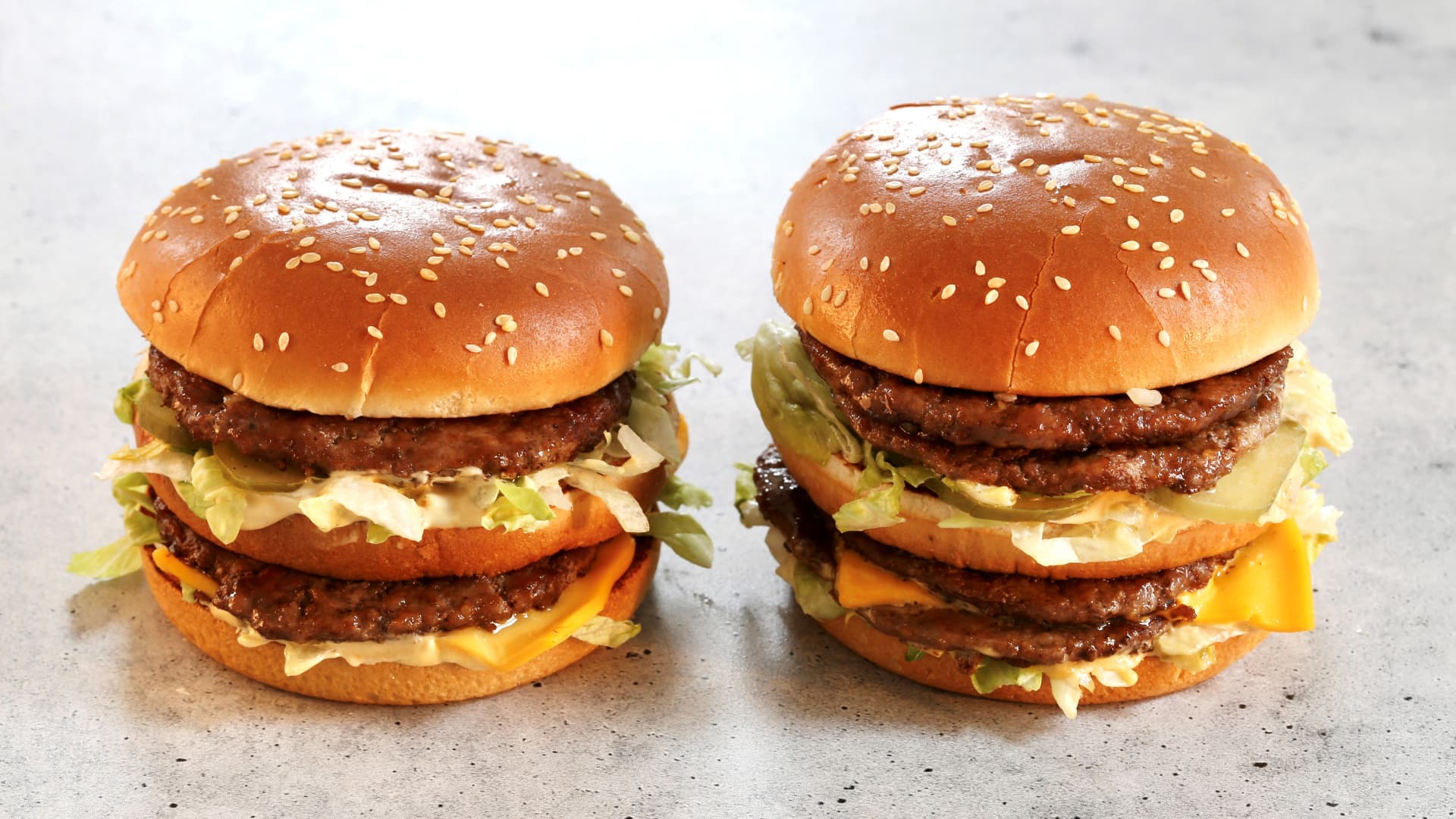A man drinks a coke and eats a Big Mac at a McDonald’s in Cologne, Germany, on May 25, 2015.
Oliver Berg | picture alliance | Getty Images
McDonald’s has upgraded its burgers — but it’s unclear if its sales will get the same boost.
The fast-food giant has outperformed its rivals in recent quarters, helped by price hikes across its menu and higher-income customers trading down to its McNuggets and Big Macs. Still, McDonald’s U.S. traffic dipped in the third quarter as low-income diners cut back their visits.
When the company announces its fourth-quarter results Monday morning, analysts are expecting U.S. same-store sales growth of just 4.4%, according to StreetAccount estimates. That’s an obvious lag compared with the third quarter’s 8.1% U.S. same-store sales growth.
McDonald’s and rival fast-food chains will face pressure to grow traffic this year. Diners won’t stomach the double-digit price hikes that fueled last year’s sales. Instead, chains have to convince their customers that their food and drinks are worth their prices — and more frequent visits.
Enter McDonald’s “Best Burger” initiative: small tweaks to the chain’s burgers that create a noticeably more flavorful product.
“Our goal was to enhance the quality and the flavor and the overall eating experience of our core burgers, but we wanted to stay true to the tastes that everyone loves,” McDonald’s U.S. Chief Restaurant Officer Mason Smoot said at a media event on Monday.
McDonald’s didn’t change the beef patty itself, but rather the cooking and assembly processes. The grills give the patties a little more breathing room as they cook. For more flavor, only six are cooked at a time, down from eight.
Onions, too, are added before the patties are cooked so they can soak up the patty’s juices. The cooked patties are kept hotter, so the overall burger is still warm by the time it reaches the customer. The cheese is melted better, the buns are upgraded and Big Macs receive more of their special sauce.
McDonald’s previous iteration of the double cheeseburger, left, and the “Best Burger” version, right.
Source: Amelia Lucas
“This is a step in the right direction for improving some of their very core products, but staying very true to who they are as well,” said analyst Mark Kalinowski, CEO of Kalinowski Equity Research.
McDonald’s started rolling out the better-tasting burgers roughly a year ago, but it has finally launched them at all locations nationwide.
Some of the company’s most important international markets, such as Australia and Canada, have already implemented “Best Burger.” Australia and Canada have outperformed some of McDonald’s other big international markets, which can be at least partially chalked up to the burger improvements, Kalinowski said.
At McDonald’s investor day in December, CEO Chris Kempczinski said “Best Burger” was on track to hit 70 markets by the end of 2023. By the time 2026 wraps up, the company expects nearly all of its markets to serve the upgraded burgers.
“With initiatives like Best Burger, we are making small changes that are adding up to big differences that our customers are really noticing,” he told investors.
McDonald’s is promoting the changes through a familiar frenemy — the Hamburglar, a McDonaldland character used in its ads dating back to the 1970s. In markets with the “Better Burger,” the chain aired a TV commercial where the mascot touted the improved taste of the burgers. McDonald’s own website now splashes an endorsement from the Hamburglar across the homepage.
The changes affect all of McDonald’s burgers except the quarter pounder. The chain already gave that menu staple its own makeover in 2018, when it switched over from frozen to fresh beef for those patties. That change resulted in McDonald’s gaining market share in the burger category for the first time in five years.
But Wall Street has mixed opinions on whether the “Best Burger” can fuel significant growth.
In a research note last month, Wells Fargo analyst Zachary Fadem named “Best Burger” as an “upside driver” for McDonald’s in 2024. However, it’s still unclear how much of a lift the company expects to see from the initiative.
Kalinowski estimates the changes could raise 2024’s overall sales 0.5%.
“I do think the net effect of this will be positive, but it’s somewhat subtle,” Kalinowski said.
Others are more skeptical.
“I’m doubtful that this drives traffic,” BTIG analyst Peter Saleh said. “I think this is probably just part of the process of upping your game over time. A lot of these concepts have to improve the quality of their food over time.”
But there are some promising early signs that customers want to try the improved burgers for themselves.
“Despite receiving no advertising at the local level until just this week, our contacts indicated Better Burger drove a 10% lift on average to burger transactions to date,” Loop Capital analyst Alton Stump wrote in a note to clients in May.
Don’t miss these stories from CNBC PRO:
Read the original article here



